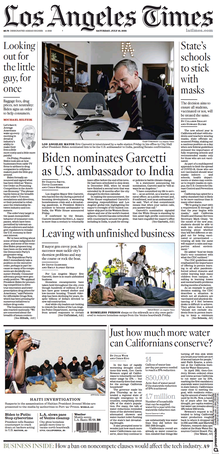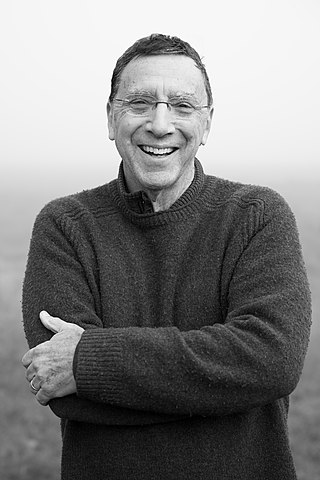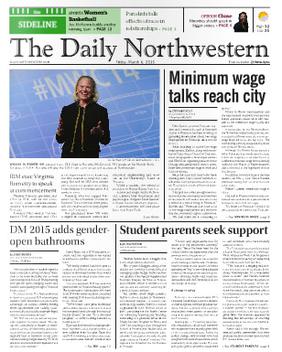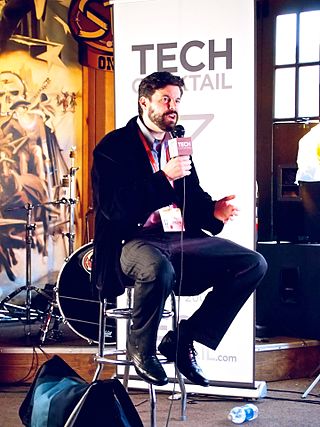Related Research Articles

The Chicago Tribune is a daily newspaper based in Chicago, Illinois, owned by Tribune Publishing. Founded in 1847, and formerly self-styled as the "World's Greatest Newspaper", it remains the most-read daily newspaper in the Chicago metropolitan area and the Great Lakes region. In 2022, it had the seventh-highest circulation of any American newspaper.

The Village Voice is an American news and culture publication based in Greenwich Village, New York City, known for being the country's first alternative newsweekly. Founded in 1955 by Dan Wolf, Ed Fancher, John Wilcock, and Norman Mailer, the Voice began as a platform for the creative community of New York City. It ceased publication in 2017, although its online archives remained accessible. After an ownership change, the Voice reappeared in print as a quarterly in April 2021.

The Los Angeles Times is a daily newspaper that started publishing in Los Angeles in 1881. Based in the Greater Los Angeles area city of El Segundo since 2018, it is the sixth-largest newspaper by circulation in the United States, as well as the largest newspaper in the western United States. Owned by Patrick Soon-Shiong and published by California Times, the paper has won more than 40 Pulitzer Prizes.

The Oregonian is a daily newspaper based in Portland, Oregon, United States, owned by Advance Publications. It is the oldest continuously published newspaper on the U.S. West Coast, founded as a weekly by Thomas J. Dryer on December 4, 1850, and published daily since 1861. It is the largest newspaper in Oregon and the second largest in the Pacific Northwest by circulation. It is one of the few newspapers with a statewide focus in the United States. The Sunday edition is published under the title The Sunday Oregonian. The regular edition was published under the title The Morning Oregonian from 1861 until 1937.

The Pulitzer Prize for Explanatory Reporting has been presented since 1998, for a distinguished example of explanatory reporting that illuminates a significant and complex subject, demonstrating mastery of the subject, lucid writing and clear presentation. From 1985 to 1997, it was known as the Pulitzer Prize for Explanatory Journalism.

John Gregory Markoff is a journalist best known for his work covering technology at The New York Times for 28 years until his retirement in 2016, and a book and series of articles about the 1990s pursuit and capture of hacker Kevin Mitnick.
Richard Read is a freelance reporter based in Seattle, where he was a national reporter and bureau chief for the Los Angeles Times from 2019 to 2021. A two-time Pulitzer Prize winner, he was a senior writer and foreign correspondent for The Oregonian, working for the Portland, Oregon newspaper from 1981 to 1986 and 1989 until 2016.

The Daily Northwestern is the student newspaper at Northwestern University which is published in print on Mondays and Thursdays and online daily during the academic year. Founded in 1881, and printed in Evanston, Illinois, it is staffed primarily by undergraduates, many of whom are students at Northwestern's Medill School of Journalism.
Don Van Natta Jr. is an American journalist, writer and broadcaster. He is an investigative reporter for ESPN, since January 2012, and the host and executive producer of “Backstory,” an ESPN docuseries. He previously worked for 16 years as an investigative correspondent at The New York Times, where he was a member of two teams that won Pulitzer Prizes.
The GW Hatchet is the student newspaper of the George Washington University. Founded in 1904, The Hatchet is the second-oldest continuously running newspaper in Washington, D.C., only behind The Washington Post. The Hatchet is often ranked as one of the best college newspapers in the United States and has consistently won awards from the Society of Professional Journalists and from the Associated Collegiate Press. Alumni of the GW Hatchet include numerous Pulitzer Prize winners, Emmy Award winners, politicians, news anchors, and editors of major publications.
David Streitfeld is a Pulitzer Prize–winning American journalist, best known for his reporting on books and technology. During his tenure as book reporter at The Washington Post, he definitively identified Joe Klein as the "Anonymous" author of the 1996 novel Primary Colors, upon which Klein admitted authorship, despite earlier denials.
Peter Mark Rinearson is an American journalist, author, entrepreneur and executive. He is a winner of the Pulitzer Prize and a former vice president of Microsoft. Much of his career has focused on enhancing tools for storytelling, from Microsoft Word to web publishing to social media.

David Leonhardt is an American journalist and columnist. Since April 30, 2020, he has written the daily "The Morning" newsletter for The New York Times. He also contributes to the paper's Sunday Review section. His column previously appeared weekly in The New York Times. He previously wrote the paper's daily e-mail newsletter, which bore his own name. As of October 2018, he also co-hosted "The Argument", a weekly opinion podcast with Ross Douthat and Michelle Goldberg.
Keith Bradsher is a business and economics reporter and the Beijing bureau chief of The New York Times. He was previously the Shanghai bureau chief and the chief Hong Kong correspondent since 2002, reporting on Greater China, Southeast Asia and South Asia on topics including economic trends, manufacturing, energy, health issues and the environment. He has won several awards for his reporting and was part of a team of New York Times reporters who won the 2013 Pulitzer Prize for Explanatory Reporting for a series of 10 articles about the business practices of Apple and other technology companies.

Charles Duhigg is an American journalist and non-fiction author. He was a reporter for The New York Times, currently writes for The New Yorker Magazine and is the author of two books on habits and productivity, titled The Power of Habit: Why We Do What We Do in Life and Business and Smarter Faster Better. In 2013, Duhigg was the recipient of the Pulitzer Prize for Explanatory Reporting for a series of 10 articles on the business practices of Apple and other technology companies.
Ken Armstrong is a senior investigative reporter at ProPublica.
Margot Williams is a journalist and research librarian, who was part of teams at the Washington Post that won two Pulitzer Prizes. In 1998, Williams was part of a team that won the Pulitzer Gold Medal for public service for reporting on the high rate of police shootings in Washington, D.C. In 2002, Williams was part of a team that won the Pulitzer Prize for National Reporting for its coverage of the "war on terror".
David Barboza is an American journalist.
David Kocieniewski is an American journalist. He is a Pulitzer Prize winner for Explanatory Reporting.
References
- ↑ "City University Television » The Open Mind » In Conversation with a Reporter". Cuny Tv. Retrieved 2012-10-14.
- ↑ Creamer, Matthew (2011-02-18). "The Week's Best Media Writing — Scientology, SEO and More | Media — Advertising Age". Adage.com. Retrieved 2012-10-14.
- ↑ Vega, Tanzina (2010-03-13). "Thank You Haggler! - Video". The New York Times. Retrieved 2012-10-14.
- ↑ Segal, David (13 October 2012). "Running in Place, Before the Treadmill Ever Arrived". The New York Times. Retrieved 1 November 2012.
- ↑ Segal, David (23 June 2012). "Apple's Retail Army, Long on Loyalty but Short on Pay". The New York Times. Retrieved 1 November 2012.
- ↑ Segal, David (13 February 2010). "One Compliment, but Two Complaints". The New York Times. Retrieved 1 November 2012.
- 1 2 Segal, David. "The Haggler — The New York Times". The New York Times. Retrieved 2012-10-14.
- ↑ Segal, David (22 September 2012). "Blowing the Whistle on Online Returns". The New York Times. Retrieved 1 November 2012.
- ↑ Segal, David (27 October 2012). "Summoning the Power of the Crowd". The New York Times. Retrieved 1 November 2012.
- ↑ Segal, David (12 February 2011). "The Dirty Little Secrets of Search". The New York Times . Retrieved 28 October 2012.
- ↑ Segal, David (22 August 2010). "In S.E.C. Fraud Suit, Texas Brothers Stand Firm". The New York Times. Retrieved 28 October 2012.
- ↑ "The 2013 Pulitzer Prize Winners - Explanatory Reporting". Pulitzer.org. Retrieved 15 April 2013.
- ↑ "2013 Journalism Pulitzer Winners". New York Times. 15 April 2013. Retrieved 15 April 2013.
- ↑ Segal, David (26 November 2010). "A Bully Finds a Pulpit on the Web". The New York Times. Retrieved 1 November 2012.
- ↑ Sullivan, Danny (28 November 2010). "Google's "Gold Standard" Search Results Take Big Hit In New York Times Story". Search Engine Land. Third Door Media, Inc. Retrieved 28 October 2012.
- ↑ Wemple, Erik (2008-11-17). "Post's Segal to NYT - City Desk". Washingtoncitypaper.com. Retrieved 2012-10-25.
- ↑ "The Shortwave And the Calling". washingtonpost.com. 2004-08-03. Retrieved 2012-10-25.
- ↑ editor, J.T. LeRoy, guest editor ; Paul Bresnick, series (2005). Da Capo Best Music Writing 2005 : the year's finest writing on rock, hip-hop, jazz, pop, country, & more (1. Da Capo Press ed.). [New York]: Da Capo Press. pp. Introduction xix. ISBN 0306814463.
{{cite book}}:|last=has generic name (help)CS1 maint: multiple names: authors list (link) - ↑ Vedder, Richard. "Staff Bios". The Washington Monthly. Retrieved 2012-10-25.
- ↑ "David Segal". This American Life. Retrieved 2012-11-01.